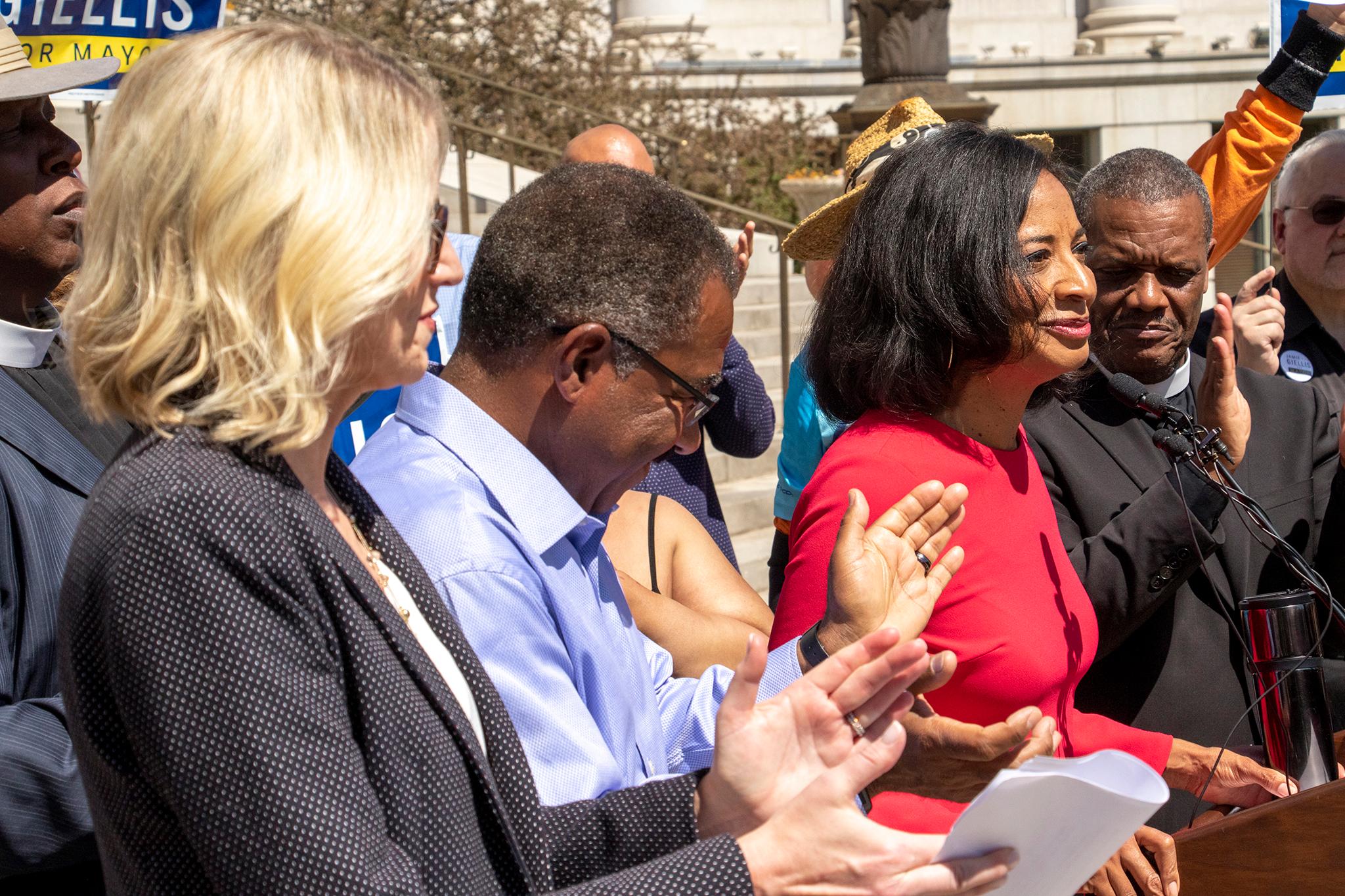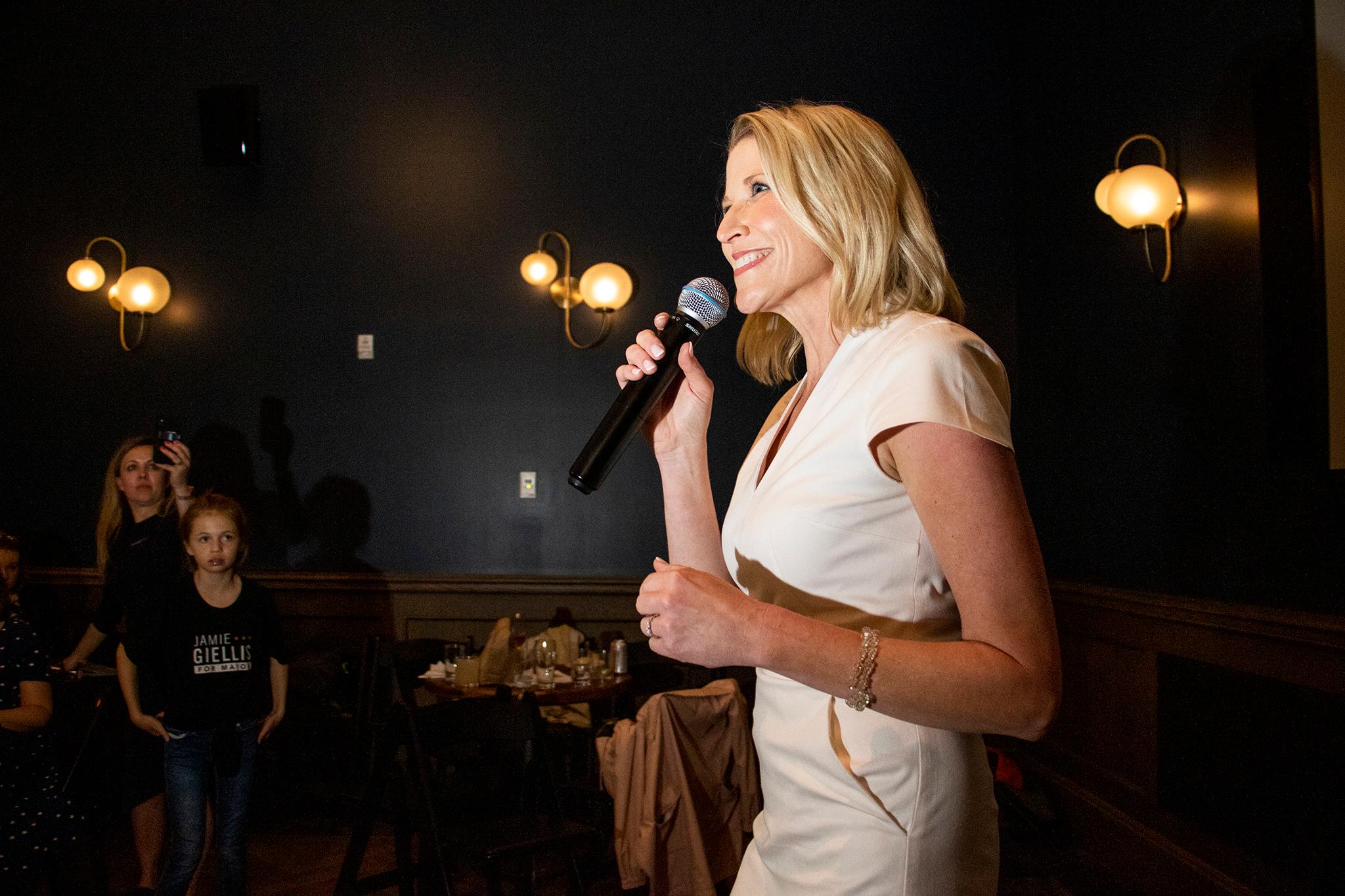During a mayoral debate back in April, Jamie Giellis said that if she were on the sidelines for a runoff election, she would vote for anyone but Mayor Michael Hancock. At a Tuesday press conference in her campaign's office, she insisted that a so-called unity ticket aligning the top three non-Hancock finishers in the general election is about her policies and vision, not just about hating Hancock's.
In the same 9News debate, Lisa Calderón and Penfield Tate both said they would vote for each other in a runoff. Now, having lost May's general election, Tate and Calderón stand with Giellis in the runoff, giving her more firepower against the incumbent than she would have had solo. Giellis hopes to win by pulling in votes from the 60,000 or so people who chose Tate and Calderón the first time around.
Both former foes support Giellis despite major policy disagreements, and Calderón has a pending lawsuit with the mayor after his administration did not renew her nonprofit's contract, raising the question: Is the "unity ticket" more about supporting Giellis or taking down Hancock?
"This is the ticket for me," Giellis said. "And this is about bringing different and disparate points of view together and finding commonality."
The trio found common ground but is not copacetic on homelessness, rent control, 'safe use' drug sites and other things.
Calderón said she voted for Initiative 300, which would have ended the urban camping ban and given unhoused people the right to sleep in public places overnight. Giellis and Tate opposed the initiative.
Giellis and Tate oppose safe use sites, also known as supervised injections sites, that let people ingest drugs with medical professionals present to prevent overdose deaths and connect people to services. Calderón supports them. Decriminalizing mushrooms fell along the same lines.
And while Tate and Calderón said they support rent control, Giellis does not.
During a Denver Post debate in April, Giellis said her role in developing the RiNo Art District did not displace people because the area was mostly warehouses. Yet Calderón blamed Giellis on the campaign trail for displacing artists and helping to gentrify Five Points.

"I do not make this decision lightly," Calderón said in a statement last week. "I believe our unified platform and leadership coalition will bring justice and equity to public safety, housing and homelessness, human services and community partnerships."
"Unity does not require unanimity," Tate said Tuesday. "It was clear to me based on that process, the campaign and talking with Jamie and folks around her ... that we agreed on a lot more issues than we disagree. And I agree with her on more issues than I agree with Michael on."
Among other things, the trio agrees on repealing the urban camping ban (part of Initiative 300), giving locals more power in the development process, reforming the Office of Economic Development to increase the number of minority- and women-owned businesses, reforming the contract process for public projects to curb corruption, and reforming how Denver deals with sexual harassment scandals by city employees.
Tate and Calderón have been noncommittal when asked if they would take a job in a Giellis administration.
Voters could follow their first-choice candidates -- or abandon them for joining Giellis.
Last week Denverite spoke with voters who will follow their leaders and choose Giellis on June 4.
Miranda Doran-Meyers, a 29-year-old Cheesman Park local, voted for Calderón. She was already leaning toward Giellis but the endorsement solidified her vote.
"I wasn't very excited about voting for Hancock," she said. "I kind of haven't forgiven him for the sexual harassment thing, but I also don't think I disliked Jamie Giellis as much as some of my friends or other people."
But the unity ticket doesn't sit right with everyone.
"It seems like they're putting all of their apples into the same basket with Jamie. She's promising less shitty things," said Kylie Dennis, who volunteered for Calderón during the election.
Dennis feels Giellis' promises are too vague and her backers, including developers and other interest groups, are similar to the ones backing Hancock.
"I just think a lot of other supporters who are people of color are giving her way too much credit just to counteract Michael Hancock," said Dennis, who is biracial. "It feels like it's fighting fire with fire."

Dennis said she won't vote for Giellis or Hancock. Neither will Calderón supporter Molly Snook.
"I'd love to see a female mayor in Denver," Snook said. "I don't want it to be someone like Jamie."
Snook said Giellis represents "the worst of new Denver."
"I see them as two sides of the same coin," Snook said. She noted both are backed by developers.
The race is getting touchy, with Hancock airing a false ad and Giellis striking back at a press conference.
A few days after Hancock's campaign ran an ad claiming, falsely, that Jamie Giellis called immigrants criminals, the challenger stood staunchly at a podium in her South Broadway campaign office and accused the mayor of hiding sexual harassment incidents by city workers and the resulting payouts by taxpayers.
Giellis had no proof. And she had not previously asked the administration for the numbers, which are part of the public record.
"The true cost of the settlements to taxpayers during Michael Hancock's administration is not fully known and I am demanding to know today," Giellis said.
Suggesting murkiness on the mayor's part, she invoked past payouts that her campaign estimates at about $1.5 million, as well as Hancock's sexual harassment of former detective Leslie Branch-Wise.
Calderón was absent from the press conference. But Tate had Giellis' back, standing directly behind her with unwavering support.
"She's headed down the right path that will take the city in the right direction," Tate said.















